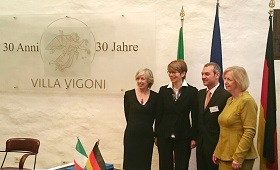Vocational Education and Training - a European Challenge: the German-Italian approach
Germany and Italy agree on the next steps for the collaboration in vocational education and training. On 3 May, Prof. Dr. Johanna Wanka and her Italian counterpart Stefania Giannini signed the Memorandum of Understanding (MoU) on Lake Como in Villa Vigoni.

Federal Minister of Education, Prof. Dr. Johanna Wanka and her Italian colleague Prof. Dr. Stefania Giannini met on Lake Como in Villa Vigoni for the signing of the Memorandum of Understanding (MoU) between the Federal Ministry of Education and Research (BMBF) and the Italian Ministry of Education (MIUR). Also present as signatories were Susanne Hoffmann, Head of the International Department of the German Ministry of Labour and Social Policy (BMAS) and her Italian counterpart, Salvatore Pirrone, Head of the Department for Active Labour Market Policy of the Ministry of Labour.
In her speech, Minister Giannini described the Italian reform of education and training as “revolutionary”. She explained that the recently introduced and extended company-based learning phases had stimulated the education and training culture and were providing the vocational orientation needed today by young people across all forms of school organisation. Italy has included both forms of school organisation within the reform - higher-level secondary school (with at least 200 hours of practice-based learning), and vocational schools (with at least 400 hours of practice-based learning). The placements are intended to be completed in companies, but also in museums and sports clubs and via placements abroad. By way of example, the minister pointed to the fact that approximately 1,500 pupils were involved in the preservation of cultural heritage in Pompeii as part of their work placements. However there is a particular focus on company-based practice which means the new Italian features of vocational education and training resemble the German model. These are not only having a revolutionary impact on the individual pupil career paths, but also on teaching staff and on the administration of schools. Minister Giannini added that the Italian state had so far invested around one hundred million Euros in the implementation of the reform.
In her reply, the German Minister emphasised the challenge Europe faces in integrating young people in the primary labour market. Federal Minister of Education, Prof. Dr. Johanna Wanka, made reference to the disruptive changes as a result of Economy 4.0 and the importance of the internationalization of dual education and training. She added that the internationalization of vocational education and training was an obligation for export nations such as Germany for ensuring that German products are also able to live up to their quality in terms of the best possible handling, servicing and performance.
The minister made reference in this regard to the important role of GOVET in bringing together key players from different departments and in identifying the most appropriate advisory services for the partners. The MoU supports the following work priorities: promoting mobility, development of tools for matching “labour demand and supply”, reducing youth unemployment and the integration of marginal groups and refugees. The success of GOVET's consultation process with the Italian Ministry of Education (MIUR) is evident in the Education Law reform of 16 July 2015. This includes reforms and amendments which improve both careers guidance as well as labour market assimilation. In addition to practice-based learning hours, the law has given the Italian chambers a new role which they are now addressing. They are learning to collaborate more closely with the new school partners. Since July 2015, vocational education and training, with a company-based and school-based element of 50 percent in each case, has been available in the so-called technical secondary schools.
The first memorandum was concluded in 2012 in Bologna. GOVET is supporting the bilateral working group involving the BMBF and the MIUR.